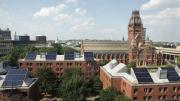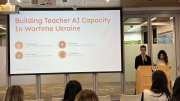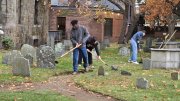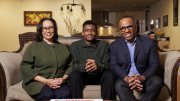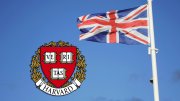Sunpower, Sunshower
Solar thermal energy panels installed atop Canaday Hall in July will provide 60 percent of the hot water to Harvard’s freshman dormitories and other Faculty of Arts and Sciences buildings in Harvard Yard. The sun heats a non-freezing, eco-friendly glycol solution—the kind used in ice cream—which circulates to the Canaday basement, where it preheats water. The $586,000 system, built to last a quarter-century or more, will pay for itself in 10 years, and prevent the emission of 4,150 tons of carbon dioxide over its life cycle—the equivalent of removing 32 vehicles from the road.
Drilling Deep
President Barack Obama, J.D. ’91, appointed three people with Harvard ties to the seven-member National Commission on the BP Deepwater Horizon Oil Spill and Offshore Drilling, charged with recommending how to “prevent—and mitigate the impact of—any future spills that result from offshore drilling.” The commission’s co-chairs are Bob Graham, LL.B. ’62, former governor of and U.S. senator from Florida, William K. Reilly, J.D. ’65, who as administrator of the Environmental Protection Agency oversaw the government’s response to the Exxon Valdez oil spill in Alaska in 1989. They are joined by School of Engineering and Applied Sciences dean Cherry A. Murray, a physicist.
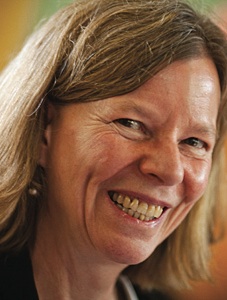
Justin Ide/Harvard News Office
Cherry A. Murray
…and Reviewing Research
Dean Murray may be accruing lots of frequent-flier miles on the Boston-Washington, D.C., route: she was also appointed to a 21-member National Research Council panel studying how to “assure the ability of the American research university to maintain the excellence in research and doctoral education” required to help the United States remain competitive and prosperous in the twenty-first century. She served on a previous National Academies committee that produced Rising Above the Gathering Storm, a 2007 report that made the case for increased federal spending on scientific research. The new report is expected next year.
Basketball’s Bad Bounce
The Ivy League and the University announced on July 1 that Harvard had “declared an unintentional secondary violation” when in 2007 assistant men’s basketball coach Kenny Blakeney (not then employed by the University) held conversations with the coaching staff during a time when he was observing prospective student-athletes. The incident was first reported the following year (see “Questions about Recruiting,” May-June 2008, page 76). The Ivy League investigated then and cleared Harvard of violations of league rules. Subsequent conversations with the National Collegiate Athletic Association resulted in the new finding; secondary violations are “inadvertent” and provide at most a “minimal advantage” to the recruiting team. Harvard has imposed unspecified recruiting limits for this academic year.

Photographs by Doug Goldman
Prodigious Plant
The University’s Amorphophallus titanum flourished and faded in little more than 24 hours, from early Sunday afternoon, July 11, to early evening Monday, July 12—its progress recorded in photographs by Harvard University Herbaria research associate Doug Goldman. When fully open, the titan arum was four feet tall and nearly three feet wide. The rare Sumatran specimen is known as the carrion flower or “corpse plant” because its fetid odor recalls decomposing meat. Although in full bloom it appears to be one enormous flower, it is actually an inflorescence of hundreds of tiny flowers hidden behind a huge, petal-like structure at the base of an enormous stalk. For further details, see harvardmag.com/titan-arum. The images show the plant on July 10 and fully open (photographed from above) on the evening of July 11.
Arboretum at Risk
A population of voracious Asian longhorned beetles was discovered in early summer on the grounds of the Faulkner Hospital, located across Centre Street from the University’s Arnold Arboretum, in Boston’s Jamaica Plain neighborhood. The beetles, which feed on maples and other hardwoods, have no known predators, and must be controlled by cutting down and chipping infested trees; since the first Massachusetts population was discovered in Worcester in 2008, 27,000 trees have been felled. The Arboretum began a survey of its collection in early 2009, and as of this July, no beetles had been found. As many as 100,000 trees within a 1.5-mile radius of the Faulkner population are now being inspected—they must be climbed—and restrictions have been imposed on transporting firewood and other materials in the area.
Putting the Arrest to Rest
The Cambridge Review Committee, appointed to examine the widely publicized arrest for disorderly conduct of Henry Louis Gates Jr., Fletcher University Professor, at his home in July 2009 by Cambridge police sergeant James Crowley, reported on June 30 that the incident was “avoidable” and that it had been escalated by mutual “misunderstandings and failed communications.” The committee’s recommendations focused on better communications, training, and police-community relations, and notably did not emphasize the racial elements of the story that figured so prominently in reporting and commentary at the time. For details, see harvardmag.com/gates-report.
Nota Bene
Handling human rights. After a decade of coordinating human-rights studies across Harvard, the University Committee on Human Rights Studies (UCHRS) has been dissolved. Its curricular, academic, and communications work will be handled by a directorate consisting of the leaders of human-rights centers at the Law School, the Kennedy School (both of which are recruiting new directors), and the Harvard School of Public Health (HSPH), plus Jacqueline Bhabha, who has been chair of the UCHRS. She is now University adviser on human rights and director of research for HSPH’s François-Xavier Bagnoud Center for Health and Human Rights (www.harvardfxbcenter.org).
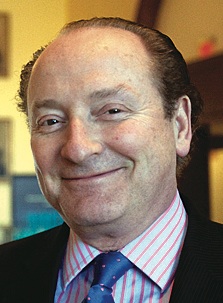
Kris Snibbe/Harvard News Office
Robert C. Merton
Downriver. Upon his retirement from Harvard Business School on June 30, McArthur University Professor Robert C. Merton, who shared the 1997 Nobel Prize in Economic Sciences, rejoined the finance faculty of MIT’s Sloan School of Management, where he had previously served as a professor for 18 years. Merton was a founder of Long-Term Capital Management, an early hedge fund, which collapsed during strains in the world economic system in 1998.
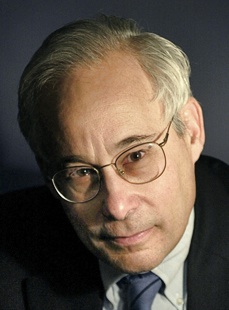
Courtesy of Donald M. Berwick
Donald M. Berwick
Healthcare’s head. President Barack Obama made a recess appointment of Donald M. Berwick ’68, M.D.-M.P.P. ’72—professor of health policy and management at the Harvard School of Public Health, and president and CEO of the Institute for Healthcare Improvement—as director of the agency that oversees Medicare and Medicaid. Berwick will have a central role in implementing the new national health legislation.
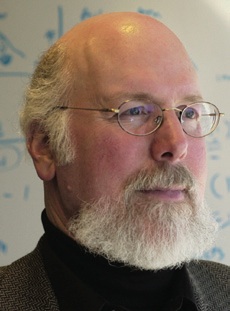
Jon Chase/Harvard News Office
Stephen M. Kosslyn
Headed west: Lindsley professor of psychology Stephen M. Kosslyn, who serves as dean of social science in the Faculty of Arts and Sciences, is leaving Harvard to become director of the Center for Advanced Study in the Behavioral Sciences, at Stanford, effective January 1.
Reregistered. Barry Kane, registrar for the Faculty of Arts and Sciences since 2003—and therefore the chief overseer of the increasingly online processes of course enrollment, classroom assignments, examination scheduling, grading, and course evaluation, departed in mid July to assume the position of assistant dean and registrar at Wellesley College.
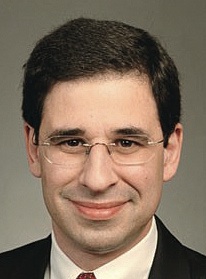
Courtesy of Eric. S. Belsky
Eric S. Belsky
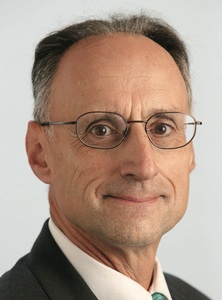
Courtesy of Nicholas P. Retsinas
Nicholas P. Retsinas
Miscellany. Juan Manuel Santos, who earned a mid-career Master of Public Administration degree at the Harvard Kennedy School in 1981 and was a Nieman Fellow in 1988, has been elected president of Colombia.…BioMed Central, a journal and open-access publisher, recognized Harvard, the University of Zurich, and the Chinese Academy of Sciences as the open-access institutions of the year. Harvard was cited for its online depository for faculty members’ research (see “Open Access,” May-June 2008, page 61).…Among those in residence at the New York Public Library’s Cullman Center for Scholars and Writers for 2010-2011 are Annette Gordon-Reed, recently appointed to positions at Harvard Law School and the history department within the Faculty of Arts and Sciences (see Brevia, July-August, page 65), and Larissa MacFarquhar ’90, a New Yorker staff writer.…Harvard Medical School’s executive dean for administration, Daniel Ennis, who had served in that role since 2007, has departed to become senior vice president for finance and administration at Johns Hopkins. Rick Mills, dean for education and global program administration, will assume the executive deanship on an interim basis.…Lecturer in urban planning and design Eric S. Belsky has been appointed managing director of Harvard’s Joint Center for Housing Studies (www.jchs.harvard.edu); he had been executive director for a dozen years. Belsky succeeds Nicholas P. Retsinas, who led the center from 1998 until June 30, and who will join the faculty of Harvard Business School, where he has been a lecturer.…Marne Levine, M.B.A. ’05, formerly chief of staff to Harvard president Lawrence H. Summers and recently chief of staff of the National Economic Council (which Summers directs), has moved to Facebook Inc., where she serves as vice president of global public policy.….The Harvard Kennedy School has revoked the master’s in public administration earned in 2000 by Russian spy Andrey Bezrukov, formerly of Cambridge, for violating the school’s policy on misrepresentation in his application. Bezrukov used the name Donald Heathfield and posed as a Canadian while registered at the school.
